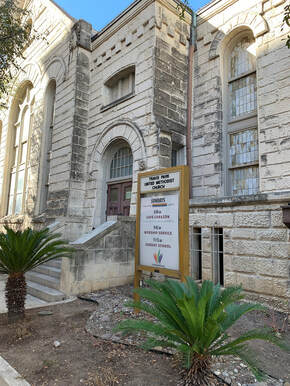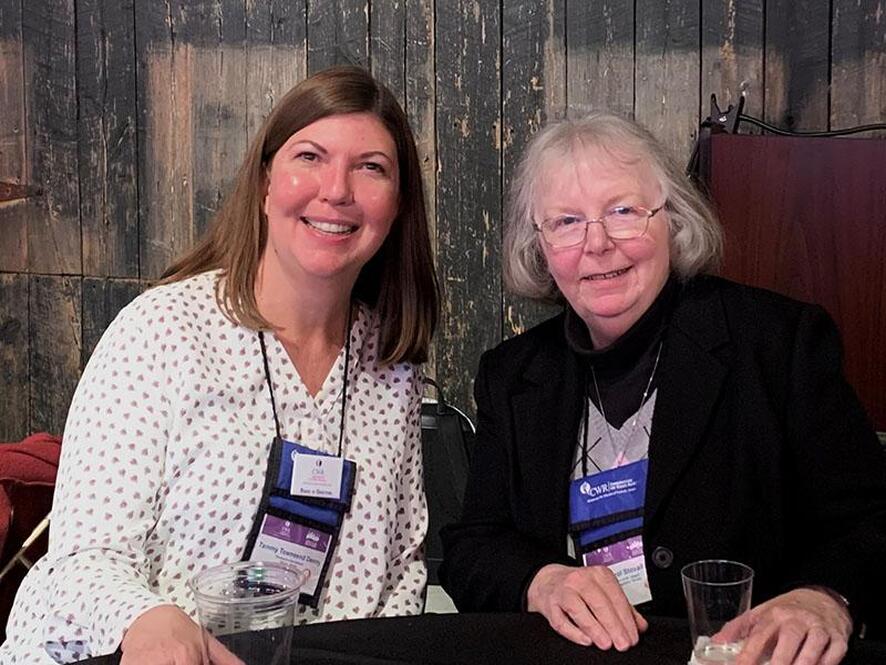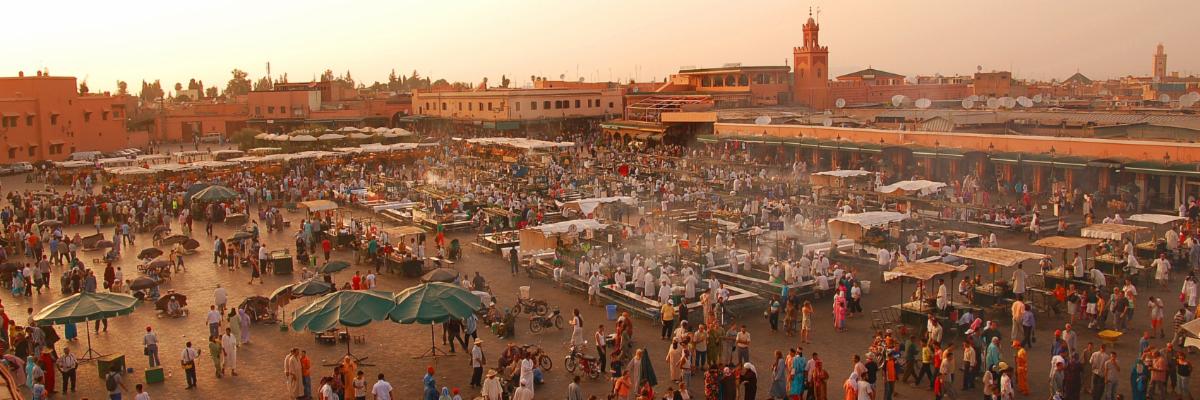Perspectives can changeby Bridget Hilbe, Spiritual Springs Community, Richmond, Texas
Last week, after reading Tammy’s refection in Sacred Touchstones, I pondered when I have ever experienced being the stranger that was welcomed in. Then I remembered a trip Dave and I made to Morocco to visit friends who were living in Casablanca. I don’t think I would have ever considered visiting this part of the world if our friends, Eric and Carolina, had not moved there. This trip turned out to be one of the most enlightening and memorable of our lives. While visiting Marrakech, I was struck by the devotion of the Muslim people in answering the call to prayer five times a day. While shopping in the busy marketplace called Jemaa el-Fnaa, I was struck by the immediate reaction of shop owners to close their booths when the call to prayer was sounded from every minaret throughout the city. Dave said it sounded like the buzz of a NASCAR race; I thought it sounded like I was in a beehive. At that moment all business stopped, as the devoted worshipers answered the Imam’s call to pray. Immediately, all Muslim men went directly to the nearest mosque. I remember reflecting that that would never happen here. Can you imagine a call to prayer being sounded in New York or Los Angeles and everything coming to stop so prayer could happen? At that time, and I still feel this today, this kind of outward devotion to faith does not exist in our society as a whole. I also found the Moroccan people to be some of the sweetest, most devoted, and welcoming people I have ever met. I am so often saddened by the stereotypes and hatred expressed in this country toward people of other faiths, especially Muslims. Perspectives can change if we challenge ourselves to be the stranger who is welcomed in. -------------------------------------------------------------------------------------------------------------------------------------------------------------------------------------------------- Image above: Maroc_Marrakech_Jemaa-el-Fna_Luc_Viatour.JPG: Lviatour derivative work: Massimo Telò, CC BY-SA 2.5, via Wikimedia Commons
0 Comments
Encounters with Faith by Tammy Townsend Denny, TI Executive Director Before you begin reading this reflection, I would like to acknowledge that the words that follow might make you uncomfortable. What I am sharing here might not align with your beliefs. And that’s OK! There is space for your deeply held faith as much as there is room for the experience I recently had. I invite you to read to the end of this reflection with an open heart and an open mind. This past Sunday I had an opportunity to attend services at Travis Park Church in downtown San Antonio, Texas. The church, affiliated with the Rio Texas Conference of the United Methodist Church, is known for its “unconditional love and justice in action.” I went to Travis Park Church not to gawk or judge or condemn but rather to fully experience our Christian faith in another way. I admit I would not have voluntarily walked in the doors of Travis Park Church if it had not been for an assignment in the “Introduction to Ecclesiology” course that I am taking this semester as part of my Master of Divinity program. I may have dismissed the church as a place for other people but not for me. However, as part of the work for my ecclesiology class, we were asked to attend a church that is not part of our faith practice. The purpose of the assignment was to explore where Christian faith traditions converge and diverge. The professor prepared us for these visits with specific instructions. We were to be respectful. We were not to be voyeurs or religious “tourists.” Instead, he challenged us to have an encounter with the experience. What I saw, what I felt, what I encountered when I attended services at Travis Park Church ranks as one of the most profound spiritual experiences I have ever had. I entered the church with an open heart and open mind, walking in side-by-side with people in need who did not have homes. I sang hymns with LGBTQ couples. I witnessed a female pastor prepare communion and invite everyone to the table. I celebrated God’s love with multi-generational families of all shapes, sizes, and colors. I was moved to tears by the joyous presence of love and acceptance. The experience reminded me of an interview with Richard "Mac" McKinney, a United States Marine who served in Afghanistan and is the subject of the short film “Stranger at the Gate.” The film tells the story of Mac’s rage-filled return from Afghanistan and his plans to bomb an Islamic center in his Indiana hometown. His plans changed when he came “face to face with the community of Afghan refugees and others of Muslim faith.” They welcomed him and offered him love, the kind of love I witnessed at Travis Park Church. We read in Matthew 25:35, “I was a stranger and you invited me in…” But, what do those words really mean to us? Are we willing to welcome the stranger and to be the stranger? This week I invite you to ponder the “strangers” in your life. What encounters are you willing to have with those who look, act, and believe differently than you? The Spirituality of Gumbo by Tammy Townsend Denny, TI Executive Director I recently made gumbo for the first time. Inspired by the okra I got from the farmers’ market and the peppers, onions, and celery I had growing in my garden, I thought I would try my hand at making a batch. I pulled out the Cajun cookbooks given to me by generous Theresians, read through the various recipes for gumbo, and began to make my cooking plans. Then, I panicked. Was it OK to use okra in Cajun gumbo? Trying to recall all the delicious gumbo I ate during my visits to Lake Charles, Jennings, and Lafayette, I couldn’t remember if okra was part of it. Chicken. Sausage. Seafood. Yes. But okra? I don’t know! Sure, no one would know up here in the North. But what would happen if I was asked by someone in Louisiana about gumbo and admitted to using okra? Would I be condemned? Ostracized? Even if I made an awesome roux, but added the wrong ingredients, I might lose the respect of the entire state of Louisiana. There was a lot at stake here: my reputation as a good cook and my credibility as the TI executive director. I am familiar with Gumbo Doctrine: Always use the Holy Trinity (onions, peppers, celery). No tomatoes unless I’m in New Orleans. White rice only. But, okra? Is okra allowed? On a Sunday afternoon, standing in my kitchen in a complete conundrum, I emailed Eileen Eskew, Petals of Faith, Jennings, Louisiana. “Will I be committing a mortal sin if I put okra in my gumbo?” She replied within the hour, demonstrating women in support of women who are trying to make gumbo for the first time. Eileen assured me okra was fine to use. My chicken-sausage-okra gumbo turned out great, though it had more of a greenish tint than the deep brown color I remember from the bowls in Louisiana. (Yes, I cooked the roux to a dark chocolate color.) Let’s blame the green tint on the dark green celery from my garden. Or maybe the okra. Unfazed by the color, my husband ate three bowls. I had two. This gumbo experience made me think a lot about the mystery of the Holy Trinity. Regardless of where or how we choose to worship, it is the relationship among and with our Creator, Redeemer, and Sanctifier -- Father, Son, and Holy Spirit – that forms the foundation of our Christian faith. Your faith may not look exactly like my faith. Perhaps yours is a little greener than mine or maybe it has tomatoes, but it is still built on the same basic relationship of love with and among our triune God. In the words of Bishop Robert Barron, God is “a family of love.” I guess you could say my gumbo was love, too… even if it was green. How will your community be remembered? by Tammy Townsend Denny, TI Executive Director Last week, I attended the Communicators for Women Religious (CWR) conference in Cincinnati. The conference was an opportunity to learn about current trends in communication in the Catholic Church, especially as the communication relates to women and the Church. Our opening keynote speaker was Sr. Norma Pimentel, MJ, Executive Director of Catholic Charities of the Rio Grande Valley, who shared about how we can become agents of unity in our society today. Sr. Norma was named to the 2020 TIME magazine list of the 100 most influential people in the world. (You can watch a 2019 presentation from Sr. Norma here.) Theresians International also hosted an exhibitors table, sharing Theresian information with nearly 120 attendees, most of whom had never heard of Theresians. During dinner one evening, a Catholic sister seated at my table heard that I worked for Theresians International. “I know Theresians,” she said. Surprised, after spending the last several days giving my elevator pitch about who we are, I asked her where she had encountered Theresians. “In Florida,” she said. “I was asked to do a presentation for one of their communities several years ago.” (The Theresian communities in Florida have since disbanded. Sister Carol Stovall, SSJ, (pictured on the right with me) was my gentle reminder that our presence and legacy continues, even in places where our communities no longer meet. This week, I challenge you to reflect on how your Theresian community is building a legacy. How will your community be remembered? |
Archives
July 2024
Categories
All
|

 RSS Feed
RSS Feed
